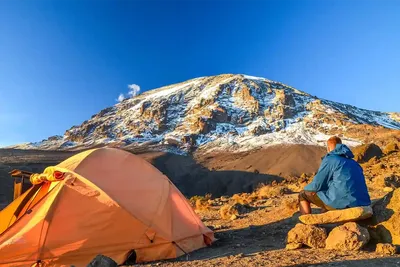Why Kilimanjaro Climbing Prices Vary Between Tour Companies
When planning to Climb Mount Kilimanjaro, one of the first things you"ll notice is the significant price difference between various tour companies. Some offer treks for as low as $1,500, while others charge over $5,000. This disparity often confuses climbers who assume all tours offer the same experience up the same mountain. However, the truth is that several key factors drive the cost of a Kilimanjaro climb—including staff treatment, safety provisions, guide experience, logistics, equipment, accommodations, and adherence to ethical practices. Understanding these elements can help you make a well-informed decision and avoid unpleasant surprises on your journey to Africa’s highest peak.

1. Fixed National Park Fees
The Tanzanian government imposes fixed park entry fees, rescue fees, camping/hut fees, and VAT. These add up to approximately $800 to $1,200 per person depending on the route and number of days. No operator can avoid these charges, so if a tour is unusually cheap, it’s likely sacrificing on other critical aspects of the climb.
2. Wages, Tips, and Ethical Treatment of Staff
Responsible companies pay fair wages and provide proper meals, gear, and sleeping arrangements for porters and guides. KPAP (Kilimanjaro Porters Assistance Project) monitors ethical treatment. Budget operators may underpay staff or overload porters with heavy gear, leading to poor conditions and staff exploitation.
3. Gear Quality and Climber Comfort
High-end operators provide quality tents, thick foam mattresses, private toilet tents, and spacious dining tents. Budget companies may offer worn-out gear or overcrowded tents, affecting rest, hygiene, and overall morale.
4. Safety Measures and Medical Backup
Premium operators carry medical kits, oxygen tanks, oximeters, and have guides trained in Wilderness First Responder (WFR) or first aid. Some even include access to helicopter rescue via AMREF Flying Doctors. Budget tours often lack these safety nets, putting climbers at greater risk.
5. Food Quality and Nutritional Support
On high-quality climbs, experienced mountain chefs prepare fresh meals with attention to nutrition and altitude needs. Meals include fruits, soups, and proteins. Cheaper operators often rely on simple carbs and minimal protein, leading to energy loss and poor performance at high altitude.
6. Accommodation Pre- and Post-Climb
Reputable companies include stays in 3 to 4-star hotels with hot showers, Wi-Fi, and breakfast. Budget operators may offer dorm-style rooms or none at all, meaning you’ll have to arrange and pay for this separately.
7. Group Size and Support Ratios
Small, guided groups allow personalized support, better pacing, and higher summit success rates. Look for companies that offer 1 guide per 2-3 clients. Larger budget groups often have fewer staff and less attention to individual needs.
8. Permits, Logistics, and Company Credentials
Properly licensed tour companies carry business permits, insurance, emergency procedures, and reliable logistics support. Cheap operators may skip legal registration, operate without insurance, and lack contingency planning for bad weather or health emergencies.
9. Environmental Commitment
Responsible tour operators adhere to Leave No Trace principles, carry out trash, and use eco-friendly setups. These practices require effort and cost. Budget tours may leave waste on the mountain or burn plastic, harming Kilimanjaro’s delicate ecosystem.
10. Tipping Transparency
Higher-end companies usually include a clear tipping guide and help collect and distribute tips fairly among the team. Others may hide tipping expectations until the end of the climb, creating tension and dissatisfaction among both climbers and crew.
11. Cultural and Educational Value
Reputable companies enrich the journey by offering cultural briefings, Swahili phrases, and insights into the Chagga people, Kilimanjaro’s local custodians. This is often absent in low-budget options, which focus purely on logistics without engagement or learning.
Price Comparison Table
| Package Type | Price Range (USD) | Key Features |
|---|---|---|
| Budget | $1,500 - $2,000 | Basic meals, old gear, large groups, minimal safety |
| Mid-Range | $2,100 - $3,000 | Good meals, quality gear, ethical porter treatment |
| Luxury | $3,500 - $5,000+ | Excellent meals, small groups, top safety and support |
Final Advice
Choosing a Kilimanjaro operator should not be based on price alone. Review credentials, read reviews, ask about KPAP affiliation, compare inclusions, and prioritize safety and ethical practices. Remember, a cheap climb might cost more in discomfort, health, or failure to summit.
Need guidance choosing a reliable Kilimanjaro tour company? Reach out to our team at Chat on WhatsApp or jaynevytours@gmail.com. We"re here to help!
SEND US A MESSAGE
Our team will reply soon
RELATED PACKAGES
- Baraka Aquarium and Nungwi Village in Zanzibar
- Diving Tour in Zanzibar
- Zanzibar Sky Diving Tour
- Dolphin Snorkeling Sandbank Tour in Zanzibar
- Horse Riding Tour in Zanzibar
- Jet Ski Tour in Zanzibar
- Jozani Forest Visiting in Zanzibar
- Quad Bike Tour in Zanzibar
- Traditional Sunset Dhow Cruise Tour in Zanzibar
- The Best Stone Town Tour in Zanzibar
- Zanzibar Butterfly Tour
MORE PACKAGES
- Mount Kilimanjaro
- Ngorongoro Crater
- Serengeti National Park
- Tarangire National Park
- Lake Manyara National Park
- Zanzibar Island
- East Africa Packages
- Tanzania Safari From Zanzibar
- Kenya packages
- Rwanda Packages
- Uganda packages
- Mikumi National Park
- Kitulo National park
- Mkomazi National park
- Selous (Nyerere National Park)
